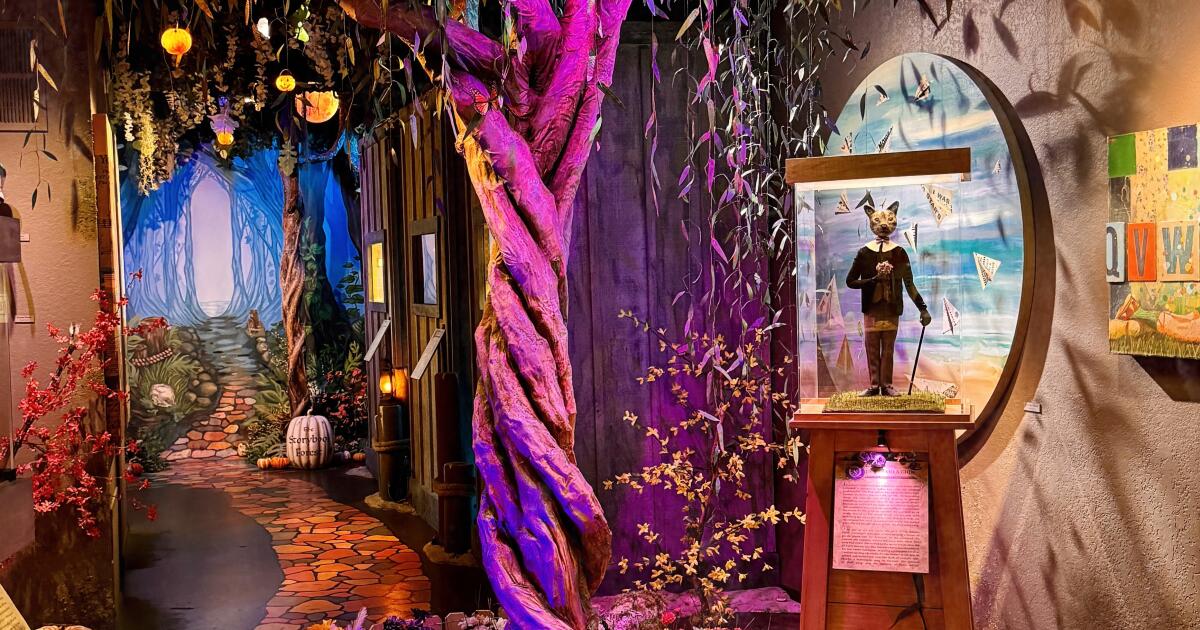The concept: Players are tasked with tracking down a rebel spy, but maybe they're the ones being tracked.
I'm standing in the courtyard of Little Tokyo and I get a text from a stranger. They tell me that I'm being watched. And then they make a comment, specifically that I'm “acting a little weird.”
I look around, taking in the behavior of everyone around me on a busy Sunday afternoon. Diners wait for a seat at a rotating sushi restaurant, shoppers queue for Hello Kitty merchandise, a couple enjoys a cake at the foot of a stage, a young man sketches the scene at a nearby table — who, if there is one, has me in his sights. “Relax your posture,” a text message tells me, and I lean on a railing to play with my phone.
A spy has gone rogue and I’m following him, trying to track him. Or maybe he’s following me. I’m told the messages I’m receiving are coming from a nearby office building and I look up, but quickly look away. I don’t want to give away the location of the agency that’s helping me.
Molly Moran holds a phone with instructions on how to play “Spies Among Us,” a text-based interactive mystery game.
(Carlin Stiehl / For The Times)
This is “Spies Among Us,” a text-based game with live actors that takes place on the streets of Little Tokyo. Think of it as a scavenger hunt for a person on the move with light puzzles inspired by escape rooms. It transforms the neighborhood into a stage, directing me through various locations in and around Japanese Village Plaza and nearby Frances K. Hashimoto Plaza (a restaurant, a market, historic landmarks) to make me hyper-aware of my surroundings. I’m told to move under a canopy of lanterns, warned that anyone around me could be a participant, and I try to blend in, looking for a place to eat. I live near Little Tokyo, am in the area often, but I’ve never felt so active — every spot, sidewalk, and porch is potentially part of the story.
My goal is to walk between these city blocks. I receive text messages telling me when and where they used a credit card, each a clue as to what they may be using or carrying. I play alone, eyeing each passerby with suspicion. At some point I know I'll have to confront a stranger and ask if they're really a spy, and I'm frantically building a profile based on the clues I receive via text.
“Some people really believe the spy is a woman. Others really believe it’s a man,” says “Spies Among Us” creator Prescott Gadd, 40. “But once that gets into your head, you’re done for. You’re in trouble. I try to make the show a little bit easier for solo players, because if you don’t have someone to bounce ideas off of, you can fall right into the trap.”

Prescott Gadd, creator and actor of “Spies Among Us,” explains the game to the Moran family.
(Carlin Stiehl / For The Times)
I fell into a few.
At one point in the game, I received several text messages in rapid succession, my location was compromised, and a potentially evil agency was about to pounce on me. Something, I was told, was tracking me, and I scoured an area of Weller Court in search of a hidden item. I pushed aside plants, probably startled a couple having coffee, and frantically searched for whatever might be giving away my location. I don’t want any spoilers, but the solution was far more mundane and simple than I had imagined.
“I think everyone likes light puzzles, but not the more complicated ones,” says Gadd, a scavenger hunt designer and interactive event organizer. “I was definitely trying to make puzzles simple and accessible, and with puzzle design, you always want to make it easier than you think.”
“Spies Among Us” has been running since April and is expected to continue indefinitely on weekends in Little Tokyo. Gadd stars in the show as a spy agency representative who wears a top hat and always carries a copy of the Times.

From left: Mark Moran and his children Jack Moran, 9, Grace Moran, 12, and Sally Moran, 6, study a clue while playing “Spies Among Us” in Little Tokyo.
(Carlin Stiehl / For The Times)
The story is light. We interact with various fictional spies via text, and as the narrative progresses we begin to discover that the company we are supposedly working for may not be the so-called good guys. Still, the narrative doesn't delve into high-stakes political espionage. As Gadd notes, this isn't the sophisticated tension of author John le Carré.
“We’re not honoring that tradition in any way,” Gadd says. “This is really all based on experience. I wanted you to find an actor solving clues in a public space. What’s the most relatable subject matter for that? Obviously, it’s about an undercover spy.”
Gadd, a Los Angeles native, has a background in theater and has helped run a dinner theater franchise in the past. The original idea for “Spies Among Us” was to create a long-running, relatively affordable, immersive theater experience, as many projects in that realm tend to be the exact opposite: short-lived and high-priced. Gadd envisioned a mall setting, but the cost of putting on a show in a mall was too prohibitive, especially considering that “Spies Among Us,” which is supposed to run about 90 minutes, has an admission fee of $27.45 per person.

“Spies Among Us” player Marcelina Kalet receives one last message from an informant on her way to solving the mystery and finding the rogue spy.
(Carlin Stiehl / For The Times)
“I wanted something safe and pedestrian-friendly, a place people would want to go,” Gadd says. “Little Tokyo was by far the number one place when I thought of places I liked to walk around. And there’s a density that makes it feel like you’re not in Los Angeles. It’s reminiscent of New York or Chicago.”
Still, the game took about two years to develop, and much of that time was spent perfecting the automated text messages players will receive, which are designed to respond to certain keywords. Most of the puzzles are solved through the app. For example, you might receive a text message telling you what the spy is wearing, but you'll have to decipher it.

Marcelina Kalet holds a card she received after solving the mystery of “Spies Among Us.”
(Carlin Stiehl / For The Times)
Since I'm relatively shy, the part of the game that gave me the most anxiety was confronting the person I thought was the spy. We're given a friendly phrase to address them with, and while my suspicions turned out to be correct, I followed the person around for several blocks before working up the courage to confront them. I found this a little odd, and at the same time, a little exciting. I was essentially stalking a stranger for a few minutes, but I was also briefly living out some spy-centric dreams.
“I wanted to make sure that whatever you said to the spy wouldn’t come off as rude if you got the wrong person,” Gadd says. “As far as I know, no one has gotten the wrong person yet.”
This is a testament to the success of “Spies Among Us.” While there are puzzles, this isn’t an escape room with a fail state. Think of it more as a play that takes place across Little Tokyo, a game that lets us become the protagonist and every outsider an unwitting extra.
And while her goal is to find a hidden spy, her greatest achievement is a reminder that the world is full of invisible narratives.

The Moran children run between locations while playing “Spies Among Us” in Little Tokyo.
(Carlin Stiehl / For The Times)












